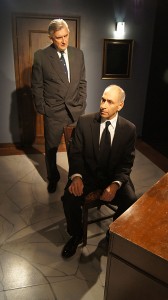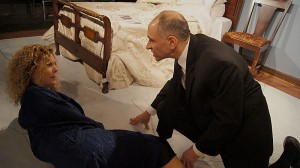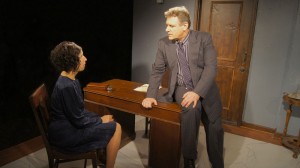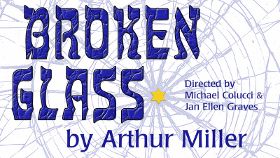EVIL WILL TRAVEL
In his great works, like Death of a Salesman and The Crucible, and even in his lesser efforts, such as Broken Glass, Arthur Miller forces us to confess a greater loyalty than those based on our obvious ties to family, class, and country. He asks us to honor our ideals, and further challenges us to admit that those ideals aren’t ours alone.
 Now enjoying a clear-cut, compelling revival at Redtwist Theatre (where it was first performed in 2004), Miller’s late work, Broken Glass, affirms the vitality of self-knowledge. Here it is the imperative of a successful banker that he accept his Jewish identity so that his wife can stop living in fear. The play equally honors Dickens’ prescription to Scrooge: “Mankind is our business.”
Now enjoying a clear-cut, compelling revival at Redtwist Theatre (where it was first performed in 2004), Miller’s late work, Broken Glass, affirms the vitality of self-knowledge. Here it is the imperative of a successful banker that he accept his Jewish identity so that his wife can stop living in fear. The play equally honors Dickens’ prescription to Scrooge: “Mankind is our business.”
Set in November 1938 immediately after Kristallnacht (a Holocaust rehearsal when Nazi thugs looted and wrecked 7,000 Jewish shops and synagogues), Miller’s metaphorical situation confronts us with Sylvia Gellburg, a middle-aged Brooklyn housewife who suddenly, through no apparent cause, loses the use of her legs. An ideological mystery, Broken Glass offers conflicting explanations for Sylvia’s paralysis, ultimately leaving it up to audience members to decide which one they prefer.
 Half in love with Sylvia himself, her doctor is convinced that marital discord accounts for her affliction. Mired in denial of his Jewish heritage, her husband Phillip thinks Sylvia crippled herself by reading, and taking personally, the Nazi abuses of their fellow Jews. Both, it seems, are right. Possessed by a dread that reminds her of a dead fetus, Sylvia feels what too many Americans did (do) not: A vulnerability to atrocities inflicted on others. Seeing the picture of two elderly Jewish gentlemen forced to clean a German street with toothbrushes, she loses any protective illusions of inviolability.
Half in love with Sylvia himself, her doctor is convinced that marital discord accounts for her affliction. Mired in denial of his Jewish heritage, her husband Phillip thinks Sylvia crippled herself by reading, and taking personally, the Nazi abuses of their fellow Jews. Both, it seems, are right. Possessed by a dread that reminds her of a dead fetus, Sylvia feels what too many Americans did (do) not: A vulnerability to atrocities inflicted on others. Seeing the picture of two elderly Jewish gentlemen forced to clean a German street with toothbrushes, she loses any protective illusions of inviolability.
But her fear is closer to home than Phillip realizes. Sylvia feels threatened precisely because Phillip pretends that he is not: in a sad case of blaming the victims, he condemns the German Jews for bringing on their troubles themselves. Perversely, Phillip’s denial of his Jewish identity makes him suspicious of anti-Semitism in his boss, a paranoia that ultimately undoes him. But it also breaks him down, enough so that he and Sylvia can finally cure each other.
Alternately discursive and melodramatic, Broken Glass is a tad too eager to explain the mysteries it presents. For all Miller’s specificity about its unhappy sexual problems (complete with the Freudian baggage of female hysteria), this troubled marriage must carry a heavy load of psychosocial significance, enough to strain the credibility of the characters.
 Directed by Michael Colucci and Jan Ellen Graves, Redtwist’s sympathetic staging wisely lets five strong actors prove their mettle. Dignified in her principled anguish, Jacqueline Grandt’s radiant Sylvia – a 1938 Cassandra envisioning the concentration camps to come – offers more than just a case of hypersensitive shell shock; her compassion is a benchmark to judge our own moral shortfalls. Playing Phillip as a repressed control freak, Neal Grofman, generous in his self-laceration (reminiscent of Jack Lemmon at his most exposed), still makes us care for this damaged self-hater. As her too-caring doctor, Colucci steers clear of medical malpractice to suggest a good man aching to give Sylvia a love he knows she needs.
Directed by Michael Colucci and Jan Ellen Graves, Redtwist’s sympathetic staging wisely lets five strong actors prove their mettle. Dignified in her principled anguish, Jacqueline Grandt’s radiant Sylvia – a 1938 Cassandra envisioning the concentration camps to come – offers more than just a case of hypersensitive shell shock; her compassion is a benchmark to judge our own moral shortfalls. Playing Phillip as a repressed control freak, Neal Grofman, generous in his self-laceration (reminiscent of Jack Lemmon at his most exposed), still makes us care for this damaged self-hater. As her too-caring doctor, Colucci steers clear of medical malpractice to suggest a good man aching to give Sylvia a love he knows she needs.
Effectively suggesting Miller’s surrounding humanity are Joe Schermoly’s period-defining design and kClare Kemock’s accurate costumes.
photos by Jan Ellen Graves
Broken Glass
Redtwist Theatre
scheduled to end on Nov. 18, 2012
for tickets call 773-728-7529 or visit http://www.redtwist.org
for info on this and other Chicago Theater, visit http://www.TheatreinChicago.com

